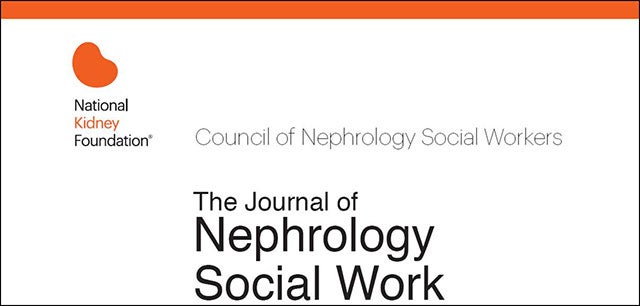The Journal Of Nephrology Social Work - Volume 43, Issue 1 (2019)

Table of Contents
The Role for Nephrology Social Work in the New Kidney Disease Paradigm—Moving Ahead by Remembering How We Got Here
Teri Browne, PhD, MSW, University of South Carolina College of Social Work, Columbia, SC
Journal of Nephrology Social Work. 43(1):9-22. ©2019 National Kidney Foundation, Inc. This is an open access article under the CC BY-NC-ND license http://creativecommons.org/licenses/by-nc-nd/4.0/.
End-Stage Renal Disease Patients, Medication Self-management, and Oppression
Tamara Estes Savage, PhD, MSW, College of Health Sciences Department of Social Work, Pembroke, NC
Medication self-management is crucial for end-stage renal disease (ESRD) patients. ESRD patients who do not adhere to their medication regimen as prescribed suffer increased hospitalizations morbidity and mortality. Furthermore, ESRD disproportionately affects historically oppressed groups, and there is some evidence that historically oppressed groups exhibit low medication self-management. In an effort to understand this issue, this paper presents a novel conceptual model using critical consciousness as the theoretical foundation. The conceptual model posits that oppression affects factors associated with medication self-management since it is embedded in our culture, society, and institutions, including the healthcare system. This research is salient to nephrology social workers for several reasons. First, the only Medicare mandate for master's level social workers on treatment teams is found in dialysis and kidney transplant centers. Thus, every dialysis patient has a social worker who can help them address all barriers affecting their medication self-management, including oppression. Second, social workers are uniquely trained to discuss topics such as oppression and aid patients as they navigate a possibly oppressive healthcare system. Third, social workers, in collaboration with patients, can make positive changes to oppressive healthcare systems which have a negative impact on patients' health. Lastly, social workers have an ethical obligation to fight social injustice, especially when the outcomes of this social injustice, oppression, can be dire for our patients' health.
Journal of Nephrology Social Work. 43(1):23-32. ©2019 National Kidney Foundation, Inc. This is an open access article under the CC BY-NC-ND license http://creativecommons.org/licenses/by-nc-nd/4.0/.
Measuring Health-Related Outcomes After a Peer-Led Educational Intervention for African Americans with Chronic Kidney Disease
Katina-Lang Lindsey, PhD, LMSW, Alabama Agricultural & Mechanical University Social Work Department, Huntsville, AL; Eunkyung Yoon, PhD, MSW, Jackson State University School of Social Work, Jackson, MS
There are multiple reasons for the disparity in chronic kidney disease (CKD) among African Americans, including higher rates of diabetes, the absence of disease-specific health knowledge, and unhealthy lifestyle behaviors (eating, exercise). This pilot study measured health-related outcomes of a social worker-coordinated and peer-led psychoeducational program, based on cognitive behavioral therapy (CBT). One-group pretest/posttest was used to measure changes in outcome variables, such as CKD-related health knowledge, healthy lifestyle and behaviors, and medication adherence.
Data from 54 African-American patients indicated statistically significant improvement in scores on the Health Knowledge Scale, but no change in healthy lifestyle and behaviors or medication adherence. Social workers should provide cost-effective and clinically proven psychosocial educational treatments for patients with chronic health conditions. This intervention can be replicated with large, diverse groups in collaboration with other medical professionals.
Journal of Nephrology Social Work. 43(1):33-44. ©2019 National Kidney Foundation, Inc. This is an open access article under the CC BY-NC-ND license http://creativecommons.org/licenses/by-nc-nd/4.0/.